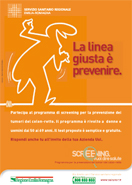Screening for the prevention and early diagnosis of colorectal cancer
Head of screening for colorectal cancer at Santa Maria Nuova Hospital
Dr. Romano Sassatelli
E-mail: sassatelli.romano@asmn.re.it
Dr. Romano Sassatelli
E-mail: sassatelli.romano@asmn.re.it
The regional screening programme for the prevention and early diagnosis of colorectal cancer will run from April 2005.
The screening is intended for men and women aged between 50 and 69. About 112,000 people living in the province of Reggio Emilia fall within this age band and represent about a quarter of the entire population.
The first test in the programme looks for faecal occult blood: this is a simple test and there is no need for special patient preparation.
Colorectal cancer is the second cause of death in Italy and Emilia Romagna today, both for men (after lung cancer) and for women (after breast cancer). It is nearly always preceded by the appearance of benign lesions in the intestine (polyp or adenomas). One of the early signs of a polyp or colorectal cancer, even when it is at the initial stage, is bleeding that is not visible to the naked eye.
The test proposed in the screening programme (looking for faecal occult blood) can find even the slightest traces of blood in the faeces. It therefore helps identify cases where the disease is at the asymptomatic stage and any anomalies that may lead to the disease. Identifying benign “polyp” or tumours when they are at the initial stage gives patients the chance to get prompt treatment.
This screening programme will run alongside those that are already in place (breast and uterus) and targets men for the first time.
The screening is intended for men and women aged between 50 and 69. About 112,000 people living in the province of Reggio Emilia fall within this age band and represent about a quarter of the entire population.
The first test in the programme looks for faecal occult blood: this is a simple test and there is no need for special patient preparation.
Colorectal cancer is the second cause of death in Italy and Emilia Romagna today, both for men (after lung cancer) and for women (after breast cancer). It is nearly always preceded by the appearance of benign lesions in the intestine (polyp or adenomas). One of the early signs of a polyp or colorectal cancer, even when it is at the initial stage, is bleeding that is not visible to the naked eye.
The test proposed in the screening programme (looking for faecal occult blood) can find even the slightest traces of blood in the faeces. It therefore helps identify cases where the disease is at the asymptomatic stage and any anomalies that may lead to the disease. Identifying benign “polyp” or tumours when they are at the initial stage gives patients the chance to get prompt treatment.
This screening programme will run alongside those that are already in place (breast and uterus) and targets men for the first time.
The screening programme
The first people in the province to be called for the pilot programme will be in the districts of Correggio and Reggio Emilia. It will gradually be extended to all of the other areas of the province in the following three months.
All men and women aged between 50 and 69 will receive a personal invitation to take part in the screening programme and come for testing. They will also receive a leaflet explaining the programme with the invitation. The Local Health Authorities intend to complete the first round of invitations within two years.
People will be invited to collect the test at their local hospital outpatients’ clinics.
The results of the test will be sent to their home address.
In addition to screening for faecal occult blood that should be repeated every two years, the programme also includes a colonoscopy if further investigation is needed (if the outcome of the test is positive) and additional testing for diagnosis and cure for anyone whose colonoscopy gives a positive result.
The colonoscopy is done at the gastrointestinal endoscopy departments at the six hospitals in the province, where the public can get all the information they need about the examination and what they need to get ready for the colonoscopy.
Screening, any additional testing and therapy are free under the programme.
All men and women aged between 50 and 69 will receive a personal invitation to take part in the screening programme and come for testing. They will also receive a leaflet explaining the programme with the invitation. The Local Health Authorities intend to complete the first round of invitations within two years.
People will be invited to collect the test at their local hospital outpatients’ clinics.
The results of the test will be sent to their home address.
In addition to screening for faecal occult blood that should be repeated every two years, the programme also includes a colonoscopy if further investigation is needed (if the outcome of the test is positive) and additional testing for diagnosis and cure for anyone whose colonoscopy gives a positive result.
The colonoscopy is done at the gastrointestinal endoscopy departments at the six hospitals in the province, where the public can get all the information they need about the examination and what they need to get ready for the colonoscopy.
Screening, any additional testing and therapy are free under the programme.

